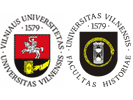After generalization of the thoughts stated in the article, the following conclusions were made:
1. Recruitment of the local inhabitants for labour in Lithuania and outside its borders – in Germany – was managed by the entire system of German and local municipal bodies. A. T. von Renteln, General Commissioner for Lithuania, under the subordination of Reichskommissariat Ostland, was at the top of this system. The German labour bureaus – arbeitsamts – operated in all districts under the district commissariats, which all, in their turn, were subordinate to the Central Arbeitsam that operated in Kaunas.
2. The municipal authorities of Lithuania – the Administration of Internal Affairs, the Administration of Labour and Social Affairs, district governors, town burgomasters, chiefs of rural districts, as well as the Lithuanian police – rendered assistance to the German arbeitsamts.
3. The Lithuanian inhabitants were recruited for various works, which, according to the occupants, were necessary for satisfaction of the needs of the country and fighting German army. In Lithuania, the local inhabitants were mostly recruited for various agricultural works, fuel and wood preparation works, as well as forced works in Germany.
4. Decrees, passed by the occupants, covered various layers of the population: farmers, urbanites, students, school-leavers, etc. For failure to fulfil labour obligations, the local inhabitants faced threat of imprisonment and big pecuniary penalties. Thus, the Nazi occupation authority was in breach of Article 52 of the 1907 Hague Convention, under which it is prohibited during the war to involve the inhabitants of the occupied territory in taking part in such work and of such proportion, which is directed against their own country.
5. The facts presented in the article and the accumulated experience of the author in investigating the archival materials of the Nazi occupation period enable the conclusion to be made that officials higher in rank were those of the Lithuanian municipal officials that assisted mostly the Nazis to recruit the labour force, specifically: P. Kubiliūnas and J. Paukštys, general councillors of internal as well as labour and social affairs, district governors, and town burgomasters. However, the major part of the Lithuanian administration – the lower and higher rank officials, which retained already from the times of the Provisional Government, – chiefs of rural districts, elders, the Lithuanian police were not active in implementing the Nazi labour policy. This is proved by the fact that Nazis did not succeed in recruiting or forced catching for works in the Reich of the planned number of the labourers.
6. Even though this article does not consider the reasons of the Lithuanian administration in aiding the Nazis to recruit the labour force, however, we are of the opinion that its such position was predetermined by several causes: 1) necessity to maximally employ the local production potential during the war for the supply of the Lithuanian population with food, fuel, etc.; 2) striving to consolidate all the forces of the country, simultaneously to help the German army in the fight against the mortal enemy of the Lithuanian nation – Bolshevism. The major part of the Lithuanians did not realize at all about their fate after the war. The illusionary principle was used as a guide: “The enemy of my enemy is not the enemy for me”.
Įteikta 2005 02 18
Priimta spaudai 2005 06 23 |


 dizainas ir programavimas giriaus
dizainas ir programavimas giriaus  dizainas ir programavimas giriaus
dizainas ir programavimas giriaus